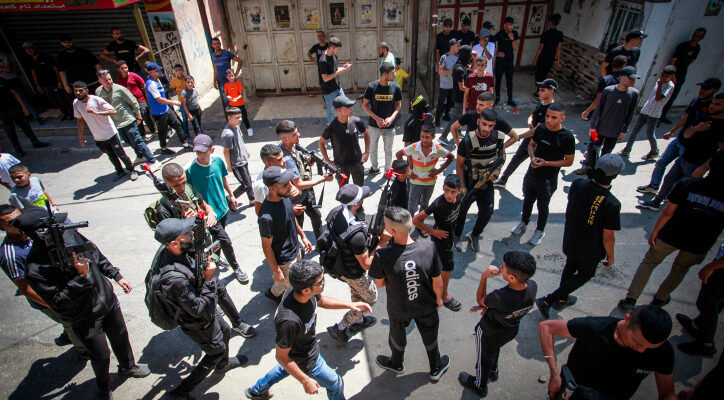Israel launched its biggest counterterror operation in months on Aug. 28 to combat this growing threat.
By Baruch Yedid, TPS
Hezbollah is supplying arms to terror groups in Shechem (Nablus) as the Iran-backed terror group also extends its influence in the Palestinian cities of Jenin and Tulkarem.
“After completing the entrenchment in the Jenin and Tulkarm area, Hezbollah is sending arms to Nablus,” various sources told The Press Service of Israel.
This is how the Iranian method of introducing terrorism into the territories of Judea and Samaria works.
Sources identified Alam Kaabi, a senior figure within the Popular Front for the Liberation of Palestine (PFLP), as orchestrating the effort to organize and arm the terror cells in Shechem.
Kaabi, a former security prisoner released in the 2011 Gilad Shalit deal, currently divides his time between Lebanon and Syria.
His contact in Hezbollah is reportedly Atallah Daoud, who oversees Hezbollah’s relations with Palestinian terror organizations.
Kaabi is also believed to have ties with Palestinian Islamic Jihad, coordinating from Damascus to advance the armament and organization of the terror cells.
After a brief expulsion from the PFLP due to his close ties with Hamas, he returned as a key figure, forming new terror groups made up of individuals affiliated with Hamas, the PFLP, and Fatah’s al-Aqsa Martyrs Brigades.
One of these cells was reportedly apprehended shortly before carrying out an attack on an Israeli community.
Palestinian intelligence sources say Kaabi’s ultimate objective is to provoke a large-scale Israeli military response in Shechem, which would destabilize the Palestinian Authority and strengthen Hamas.
Indeed, the PA’s influence in Shechem is waning with frequent reports of armed groups openly challenging Ramallah’s authority.
In recent days, the PA’s General Intelligence has resorted to sheltering dozens of terrorists overnight to prevent them from being targeted by the Israel Defense Forces.
This marks a shift from the PA’s earlier refusal to protect the gunmen.
The PA has also reportedly supplied some terrorists with M16 rifles as part of a broader attempt to contain the growing unrest in the region.
However, the security apparatus of the PA is weakening, with several police stations left empty and others lacking basic operational resources.
There are growing Palestinian fears that Israel will resort to evacuating refugee camps where Hamas has managed to establish a presence.
Israel launched its biggest counterterror operation in months on Aug. 28 with raids focused on the Jenin refugee camp, the Nur al-Shams camp in Tulkarm, the El Fara camp in northwestern Samaria in the Jordan Valley, and the nearby village of Tubas.
The raids — dubbed Operation Summer Camp — were prompted by intelligence indicating that terror groups were preparing further attacks on Israel.
Explaining the significance of the raids, Yaron Bouskila, CEO of the Israel Defense and Security Forum, recently told TPS-IL, “Iran is funneling weapons and ammunition through the Jordanian border to Samaria. The whole area is now flooded with weapons, so we are fighting these terrorist organizations while their supply lines remain open.”
On Aug. 21, Israel assassinated Khalil Hussein Khalil Al-Maqdah in Lebanon, who, along with his brother, Mounir, directed terror activity in Judea and Samaria on behalf of Iran’s Islamic Revolutionary Guards Corps.
Following the assassination, analyst Beni Sabti told The Press Service of Israel that Iranian weapons smuggling through Jordan has been going on for years but increased sharply after October 7.
Sabti is a researcher on Iran for the Institute for National Security Studies, which is affiliated with Tel Aviv University.
“It’s reached dangerous levels. The Iranians have hubris. They see October 7 as a victory and they will continue smuggling weapons,” Sabti told TPS-IL.
Since October 7, Israeli security forces have arrested approximately 5,000 wanted Palestinian terror suspects, of whom 2,000 were members of Hamas.




